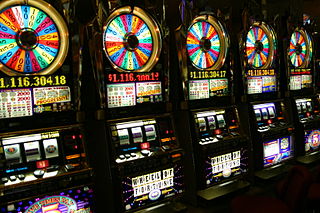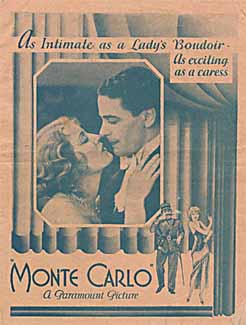Related Research Articles
A casino is a facility for certain types of gambling. Casinos are often built near or combined with hotels, resorts, restaurants, retail shopping, cruise ships, and other tourist attractions. Some casinos are also known for hosting live entertainment, such as stand-up comedy, concerts, and sports.

Games available in most casinos are commonly called casino games. In a casino game, the players gamble cash or casino chips on various possible random outcomes or combinations of outcomes. Casino games are also available in online casinos, where permitted by law. Casino games can also be played outside casino for entertainment purposes like in parties or in school competitions, some on machines that simulate gambling.

Roulette is a casino game named after the French word meaning little wheel which was likely developed from the Italian game Biribi. In the game, a player may choose to place a bet on a single number, various groupings of numbers, the color red or black, whether the number is odd or even, or if the numbers are high (19–36) or low (1–18).
Online casinos, also known as virtual casinos or Internet casinos, are online versions of traditional casinos. Online casinos enable gamblers to play and wager on casino games through the Internet. It is a prolific form of online gambling.

Charles De Ville Wells was an English gambler and fraudster. In a series of successful gambles in 1891 he broke the bank at Monte Carlo, celebrated by the song "The Man Who Broke the Bank at Monte Carlo". Subsequently, he was often referred to, especially in the press, as "Monte Carlo Wells".
Lucky Stiff is a musical farce. It was the first collaboration for the team of Lynn Ahrens and Stephen Flaherty (music). The show is based on the 1983 novel The Man Who Broke the Bank at Monte Carlo by Michael Butterworth. It was created and performed at Playwrights Horizons off-Broadway in 1988, and won the Richard Rodgers Award for that year. The musical was seen in London's West End in 1997 but has not had a Broadway production. A film version had a limited release in theatres in 2015 but received mostly negative reviews.

Colin Whitton McCallum, known by his stage name Charles Coborn, was a British music hall singer and comedian. In a long career, Coborn was known largely for two comic songs: "Two Lovely Black Eyes", and "The Man Who Broke the Bank at Monte Carlo."

William Nelson Darnborough (1869–1958), also known as Bill Darnborough, was an American gambler from Bloomington, Illinois, who was known for his success in roulette at Monte Carlo from 1904 to 1911. During that time period he amassed a fortune of $415,000.($11,374,844) in 2020 In one of the more legendary feats, Darnborough bet on the number 5 and won on five successive spins.
Advantage gambling, or advantage play, refers to legal methods used to gain an advantage while gambling, in contrast to cheating. The term usually refers to house-banked casino games, but can also refer to games played against other players, such as poker. Someone who practises advantage gambling is often referred to as an advantage player, or AP. Unlike cheating, which is by definition illegal, advantage play exploits innate characteristics of a particular game to give the player an advantage relative to the house or other players. While not illegal, advantage play is often discouraged and some advantage players may be banned by certain casinos.

The Monte Carlo Casino, officially named Casino de Monte-Carlo, is a gambling and entertainment complex located in Monaco. It includes a casino, the Opéra de Monte-Carlo, and the office of Les Ballets de Monte-Carlo.

Bay of Angels is a 1963 French romantic drama film written and directed by Jacques Demy. Starring Jeanne Moreau and Claude Mann, it is Demy's second film and deals with the subject of gambling. The costumes were designed by Pierre Cardin.

Man of the Moment is a 1935 British comedy film directed by Monty Banks and starring Douglas Fairbanks Jr., Laura La Plante and Margaret Lockwood. It was made at Teddington Studios by the British subsidiary of Warner Brothers. The film's art direction was by Peter Proud.

Monte Carlo is a 1930 American pre-Code musical comedy film, directed by Ernst Lubitsch. It co-stars Jack Buchanan as a French Count Rudolph Falliere masquerading as a hairdresser and Jeanette MacDonald as Countess Helene Mara. The film is notable for introducing the song "Beyond the Blue Horizon", which was written for the film and is first performed by MacDonald and a chorus on the soundtrack as she escapes on the train through he countryside. Monte Carlo was hailed by critics as a masterpiece of the newly emerging musical film genre. The screenplay was based on the Booth Tarkington novel Monsieur Beaucaire.

The Man Who Broke the Bank at Monte Carlo is a 1935 American romantic comedy film made by 20th Century Fox. It was directed by Stephen Roberts, and starred Ronald Colman, Joan Bennett, and Colin Clive. The screenplay was written by Nunnally Johnson and Howard Smith, based on a play by Ilya Surgutchoff and Frederick Albert Swan. The film was inspired by the song of the same name popularised by Charles Coborn.
SuperCasino is a gambling television channel which aired on Channel 5, in the United Kingdom, from 2009 to 2018.
The Société des Bains de Mer, officially the Société Anonyme des Bains de Mer et du Cercle des Etrangers à Monaco, is a publicly traded company registered in the Principality of Monaco. SBM manages and owns the Monte Carlo Casino, the Opéra de Monte-Carlo, and the Hôtel de Paris in Monte Carlo.

"The Man Who Broke the Bank at Monte Carlo" is a popular British music hall song published in 1891 by Fred Gilbert, a theatrical agent who had begun to write comic songs as a sideline some twenty years previously. The song was popularised by singer and comedian Charles Coborn.

François Blanc, nicknamed "The Magician of Homburg" and "The Magician of Monte Carlo", was a French entrepreneur and operator of casinos, including the Monte Carlo Casino in Monaco. His daughter, Marie-Félix, married Prince Roland Bonaparte.
Hermione Maria Louise Darnborough, later Hermione Mathieson, was an English principal ballerina who made her name at Sadler's Wells in the 1930s. She retired at a young age after marrying the conductor and composer Muir Mathieson.

Joseph Hobson Jagger was an English textile industry businessman from Yorkshire, who in around 1881 is said to have "broken the bank at Monte Carlo" by identifying and exploiting biases in the wheels of the roulette tables there. He used his winnings to buy property in Bradford. In 2018 he was the subject of a biography by his great-great niece Anne Fletcher.
References
- ↑ Count Corti (1934). The Wizard of Homburg and Monte Carlo. London: Thornton Butterworth.
- ↑ Herald, G. W. and Radin, E. D.: The Big Wheel (London: Robert Hale, 1965)
- ↑ Fletcher, Anne (2018), From the Mill to Monte Carlo: The Working-Class Englishman Who Beat the Monaco Casino and Changed Gambling Forever, Amberley, ISBN 978-1445671390
- ↑ "The Times, London". 3 August 1891.
- ↑ "The Times, London". 9 November 1891.
- ↑ Michael Kaplan and Ellen Kaplan, Chances Are...: Adventures in Probability, page 60-61.
- ↑ Berenson, Bernard. My Dear BB - The Letters of Bernard Berenson and Kenneth Clark, 1925-1959. Yale. p. 11 (footnote).
- ↑ The Cornishman, 19 January 1911
- ↑ Books which claim that Bower inspired the song include: Gilbert, D.: Lost Chords (New York: Cooper Square, 1970); and Lax, R. & Smith, F.: The Great Song Thesaurus (New York: Oxford University Press, 1984)